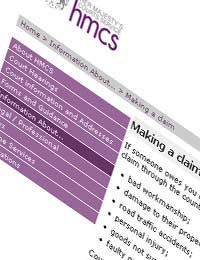How to Make a Claim in Court

Being owed money by someone can become an all-consuming frustration. You know you are in the right, you have tried to be reasonable and yet being reasonable has got you nowhere. If all else has failed it may be that the only thing left is to take them to court.
Going to court should always be treated as a last resort. Before starting a claim against someone the following questions should be considered:
- Have I really exhausted all other possibilities? In addition to negotiating – or trying to negotiate - with the person or company who is at fault there are alternatives to the courts such as mediation and schemes run by industry ombudsmen.
- If I win will the other side pay me the money I am owed? If the other party has disappeared or is bankrupt a victory in court may amount to no more than a matter of principal.
- Is my case suitable for the small claims track? If the case is worth more than £5000 or will include complicated legal arguments the answer may be no, meaning that considerable legal fees could be incurred.
- Am I entitled to Legal Aid? The availability of Legal Aid is now extremely restricted in civil cases. Most people issuing a claim will find that they are not entitled to any financial assistance.
Do I Have to Do Anything Before Starting a Claim?
Anyone considering going to court should already have done everything they reasonably could to reach an agreement with the other side before starting a claim. In addition, for some types of cases, special “pre-action protocols” apply. For example, claims for personal injury, professional negligence and disrepair of housing all have pre-action protocols. Whilst failure to follow a protocol may not be fatal to a claim, it may have an impact on the amount of damages or costs that a court is prepared to allow – even if the claimant wins the case.Making a Claim
All claims are started in the same way. A claim form is filled in by the person starting the case or by their solicitor if they have one. The claim form sets out:- the parties involved in the case;
- a brief summary of the nature of the dispute;
- the value of the claim;
- any interest or costs which are being sought.
Claim forms can be obtained from any county court or can be downloaded from Her Majesty’s Court Service (HMCS) website. This website also has a list of all county courts in England and Wales together with their addresses. Most courts’ offices are open from 10.00 am to 4.00 pm, although they may close for lunch between 1.00 and 2.00. Whilst court staff are not able to give legal advice about the basis or merits of a particular claim they will be able to advise on the procedure that should be followed and the forms that should be filled in.
The claim forms come with guidance notes on filling them in. It is vital that these are read before filling in the form. It is very easy to make mistakes on a claim form which can then lead to a substantial delay in the claim being resolved.
Once the claim form has been filled in the person bringing the claim, the claimant, must make copies of the form so that there is one for the court and one for each defendant that they are claiming against – as well as a copy for themselves. All of the copies, other than the claimant’s, must then be handed in at the court.
Issuing a Claim
Once the claim form has been filled in it is lodged at court and the claimant will have to pay a fee to issue the claim. The cost of issuing a claim depends on its financial value. For cases falling within the small claims financial limits the following fees apply (as at May 2008) when issuing a claim at a county court office counter. If the amount claimed is:- Up to and including £300 - £30;
- Over £300 but not more than - £500 - £45;
- Over £500 but not more than £1000 - £65;
- Over £1000 but not more than £1500 - £75;
- Over £1500 but not more than £3000 - £85;
- Over £3000 but not more than £5000 - £108.
Business energy with a difference
Looking for better business energy options? Whether it’s advanced monitoring, new connections, or adjusting capacity, our sponsor, Purely Energy can help.
📞 Call 0161 521 3400 or simply send us your details below for a no-obligation chat.
Sponsored by Purely Energy
Purely kindly sponsors this site. They help businesses deal with all aspects from securing the lowest prices, capacity upgrades, usage monitoring using their proprietory software, Purely Insights, and many other aspects. Need help with your commercial energy? Enter your details below and they’ll get back to you.
- Small Business: Going to Court Over a Debt
- Making a Complaint About the Small Claims Court
- Establishing Fault in a Small Claim
- Unfair Bank Charges Cases in the Small Claims Court
- Road Traffic Accident Compensation Claims
- What if the Other Party Makes a Counterclaim?
- Mediation to Resolve a Small Claims Dispute
- What Happens After a Legal Claim is Issued?
- How Court Papers and Documents are Served
- Notification of Hearing and Allocation Questionnaire
- Small Claims Advice: Is Your Claim Valid?
- Making Small Claims Online
- How to Make a Claim in Court
- Introduction to the Small Claims Court



